Truly, I cannot put a finger on how old I would estimate Catherine Lim to be.
I mean, look at that picture — does that look like a 77-year-old to you?? It sure doesn't to me.
Even more so when she tells me with all sincerity that not a single strand of her hair has ever turned paler than its current ebony.
On all three occasions I met her — once at her home too, by the way — before writing this, her make-up was always immaculate, her fashion and dress sense far more elegant than mine will ever be.
More importantly, I would argue that her energy and enthusiasm, which appears to multiply with the number of people around her, exceeds that of a 25-year-old — never mind someone who is in their 30s (me).
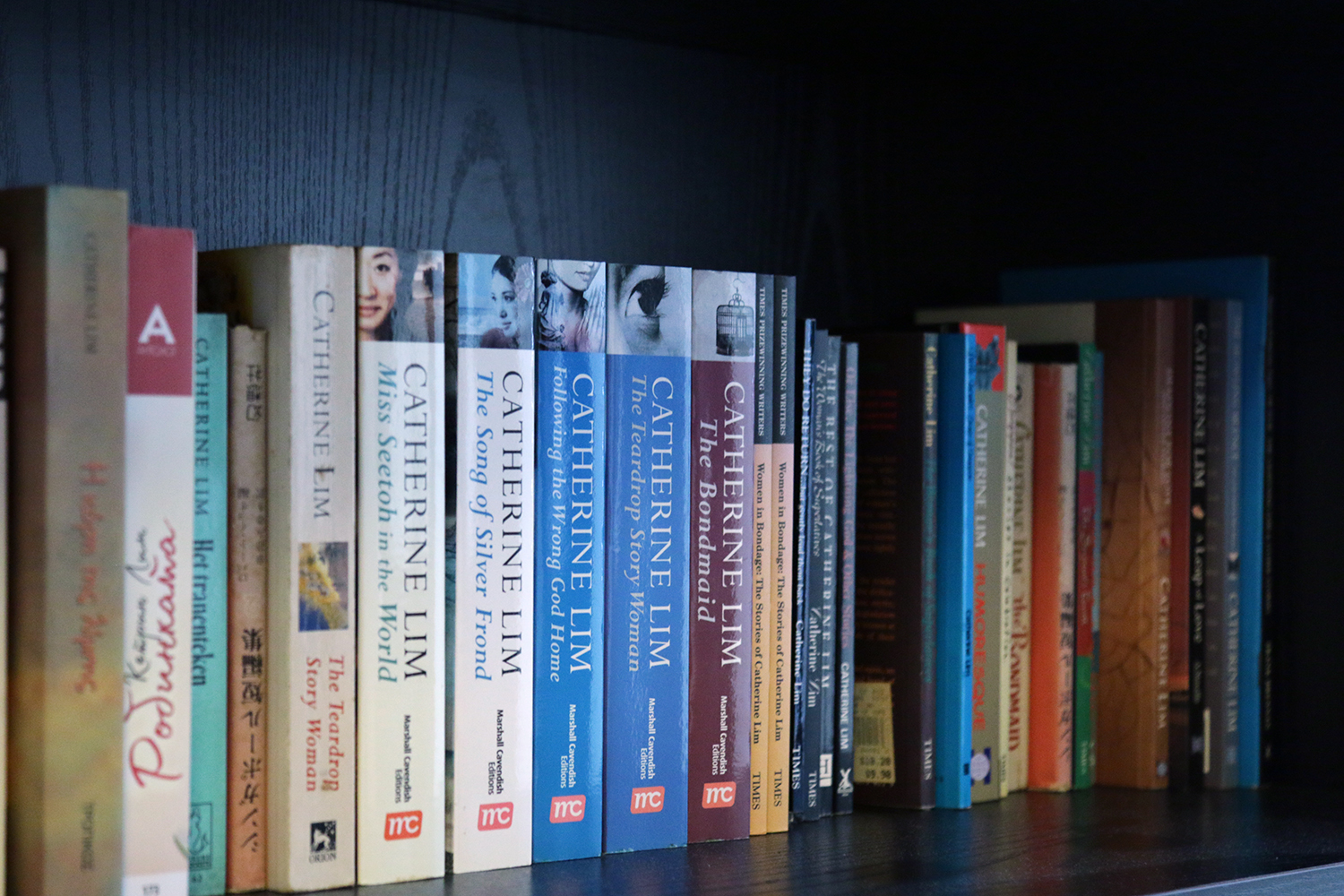 A collection of Lim's titles in a bookshelf in her study. Photo by Joshua Lee
A collection of Lim's titles in a bookshelf in her study. Photo by Joshua Lee
The first time I met the celebrated Singaporean author, it was 4pm and we met outside Robinson's at her favourite haunt: The Centrepoint — a place where, I'll be honest, has largely become a part of my childhood memories.
But I can't help but feel like my wistful emotions about The Centrepoint reflect how I feel about Lim, a lady whose name I recognised and admired for decades, first as a young, enthusiastic book reader, and later on as a news hound fascinated by this woman whose criticism of the late Lee Kuan Yew and the People's Action Party (PAP) won her his notice and mentions.
But in some ways, she's a little trapped in that past — she doesn't have a mobile phone, for one (we arranged our meetings over email), so she has no idea how to use any private hire car services (she has become quite nifty with the Comfort taxi booking hotline though) and takes a taxi anywhere beyond a one-kilometre radius from her Sixth Avenue home (because she declares herself too old to learn how to take the bus or MRT); her fitness regime (daily planks, weights and walks) that puts my nonexistent one to shame; we've also already discussed her appearance, which pretty much hasn't changed in the past 30 years or so.
The most important way this backwardness shows, though — to me, at least — lies in the once-avid political commentator's gaping absence from the sphere of Singapore's political discourse, to the point where, after a strikingly strongly-worded open letter to Prime Minister Lee Hsien Loong in 2015, Lim dropped completely off the radar — even taking her website, which painstakingly compiled all her writing and especially political commentary up to that point, offline.
The conversations we had were varied and fascinating, don't get me wrong — at our first meeting over noodles and dumplings, she tells me, apart from about her atheism, quantum physics and how she can spend an entire day Googling topics she dreams up, about her ex-husband's dementia and how there was once he returned from a trip and forgot where he lived (and by extension, where he was supposed to go from the airport), so he now stays at a home.
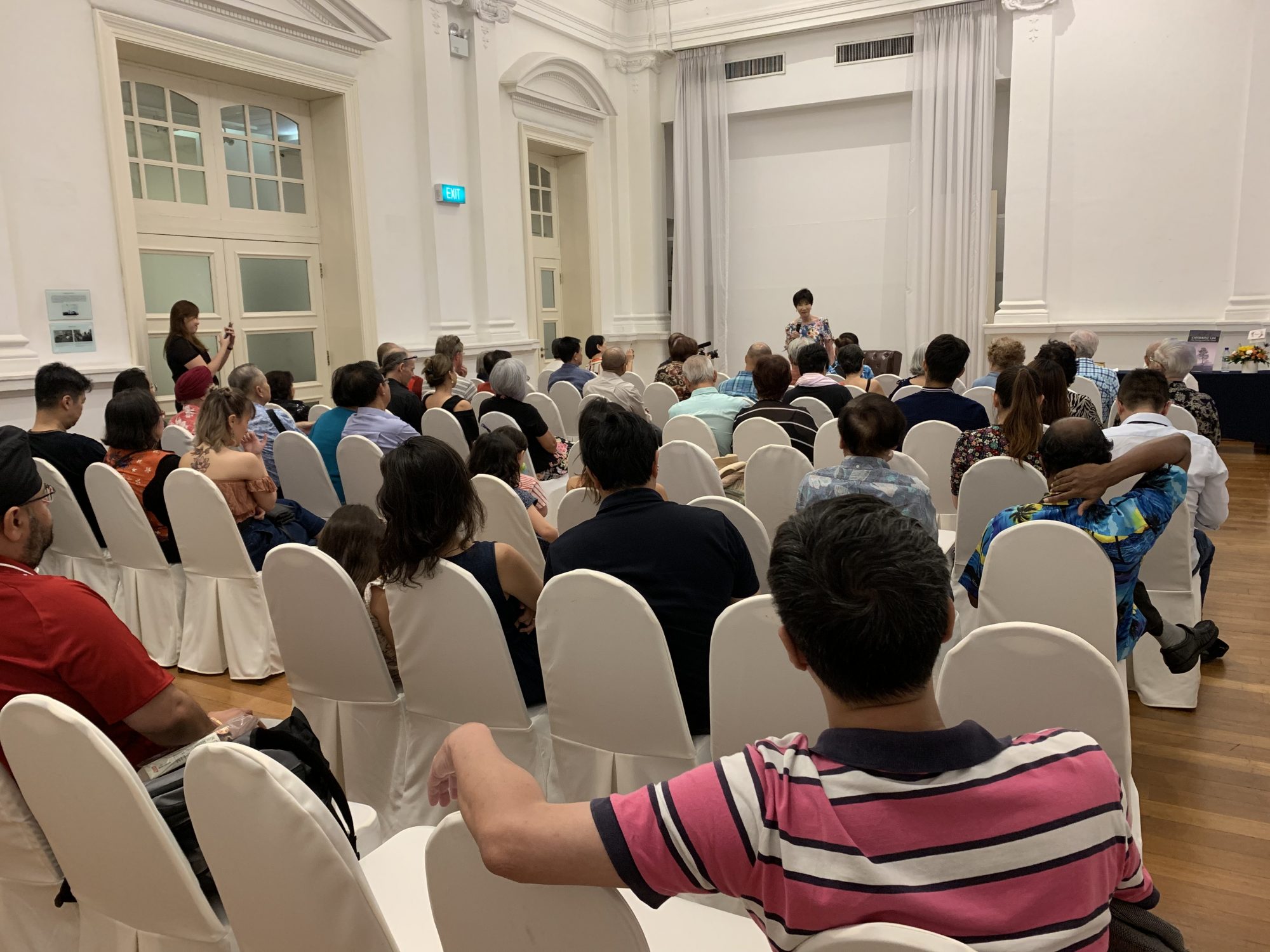 Photo by Jeanette Tan
Photo by Jeanette Tan
Our third time meeting was at Lim's book launch at the Arts House for a new collection of short stories (about the supernatural) she recently completed, The Loving and the Dead. There were about 70 or so people present — some youngish but mostly slightly older — who turned up to spend a good hour-plus being regaled by her larger-than-life personality and storytelling charisma.
What struck me most about that event was Lim's amazing style of speech — the teacher in her is evident as she projects her voice with clarity, diction and melodious intonation, and she is also the only person I know now who speaks like a sophisticated English composition — dropping in words like "gluttonous", "acerbic" and "urbanity" not only into her explanations into her story and character choices, but in all the conversations she had with me.
Ultimately, though, it was at our interview proper (our second meeting at her apartment, over plates of sumptuous sliced strawberries and Bengawan Solo sugee cookies) that I was able to conclude — or at least I think I could — who this astonishingly elegant and energetic matriarch of literature and, is, and why she chooses this "backward" life: deciding not to be too contactable, and to "disappear" four years ago, after two decades of active, sharp-tongued participation in Singaporean societal debate.
But first, if you're still with me, some background:
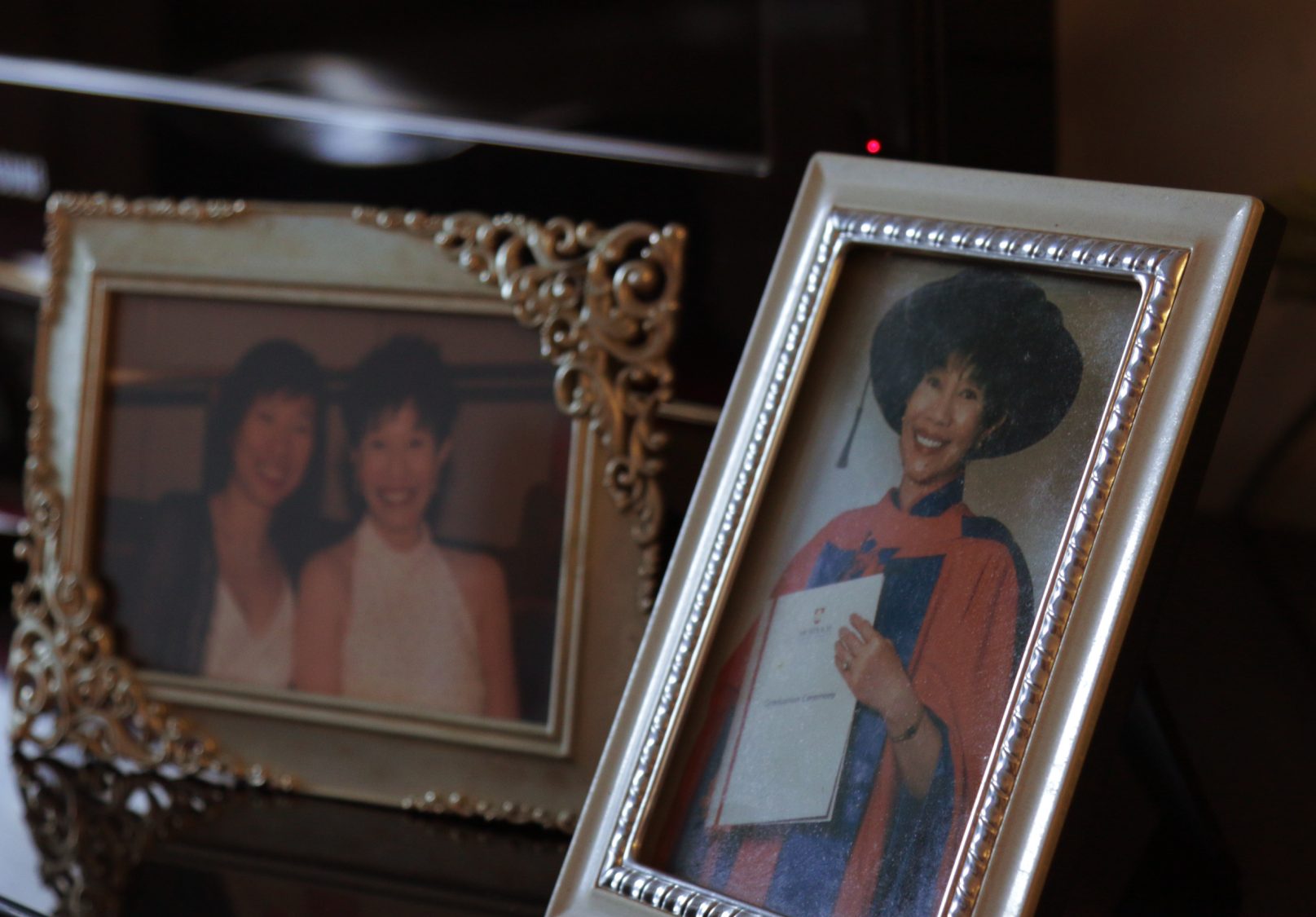 A small photo of Lim graduating with her PhD on a bookshelf in her study. (Photo by Joshua Lee)
A small photo of Lim graduating with her PhD on a bookshelf in her study. (Photo by Joshua Lee)
Lim's life has been in almost every way a charmed one: born and mostly educated in Malaysia, Lim, the lucky number eight out of 14 siblings, and her then-husband decided to move here in search of a better life.
Her Catholic school upbringing involved her being taught by CHIJ nuns, who inspired her to convert to Catholicism when she was 15, but she says it was only after she divorced her husband ("about 40 years ago") that she "felt a great liberalisation" and started reading authors she believed the Catholic Church did not allow — Voltaire, Nietzsche, and prominent atheist Richard Dawkins.
But in the meantime, she became a teacher here, got a scholarship to do a PhD in applied linguistics at NUS, and also was a Fulbright scholar, and after rising up the ranks at MOE, left to start writing short stories and later novels full-time instead.
The Catherine Lim Affair
Lim first came to prominence in the political sphere with two pieces published in The Straits Times in 1994 called "The PAP and the people — A great affective divide" and "One government, two styles", published three months later.
In the first article, she said that there was a growing emotive disconnect between the PAP government and the people. In the second article, she opined that Emeritus Senior Minister Goh Chok Tong (who was PM at the time)'s "people-oriented" style was being submerged under "the old style of top-down decisions".
The articles were significant because it was the first time PM Goh had publicly criticised a Singaporean who is not a politician regarding her comments on politics.
The exchange between her and ESM Goh became known as "The Catherine Lim Affair" — where he told her in no uncertain terms that if she wished to comment on politics in public regularly, she should join a political party; also, he deemed what she had written about the government as disrespectful, and "out of bounds" in political discourse. It gave rise to this epic quote from ESM Goh in Parliament:
"If you land a blow on our (the government's) jaw, you must expect a counter-blow to your solar plexus."
She continued writing about politics in commentaries published in newspapers and subsequently online on her eponymous website, until sometime after a final open letter she penned to PM Lee after blogger Roy Ngerng was ordered to pay S$150,000 in defamation damages, when she took her site offline in mid-2015.
So the big question is, why?
Lim's answer isn't so easy to comprehend: she feels she was part of something she refers to as "the Lee Kuan Yew dispensation" — which she explains is the political era in which a certain social compact was struck between LKY's leadership and Singaporeans, as well as the second generation that followed (ESM Goh's), and a little of PM Lee's third generation.
"I see myself as belonging to the Lee Kuan Yew dispensation. And I want young people to take over. I feel in fact very humbly that they are more attuned to the climate than I am.
I'm a little bit out of touch, I don't understand the mentality and I suspect the new leaders, I don't think I understand them fully. And they are now in charge... so the old dispensation is virtually over. The whole dispensation is over.
So, let young people be the voice now of Singapore... I just want to be off the scene, you know, it’s part of my... fading away."
And, she says, she took her website off because she thought of it as "too much of a vanity". Although, she admits, it is "still going on" because she continues to write — fiction, though.
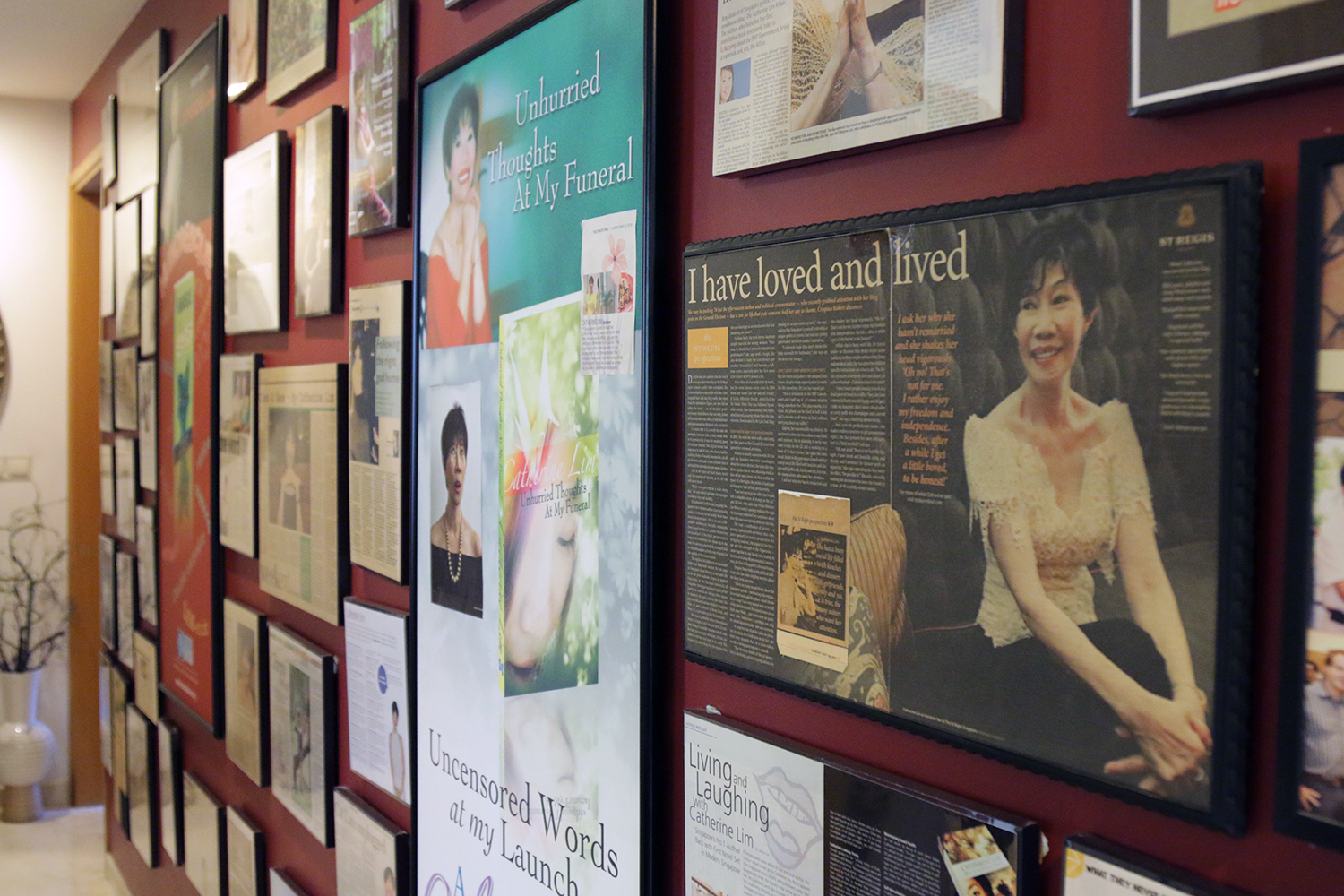 What Lim calls her "vanity wall" of press clippings about her. (Photo by Joshua Lee)
What Lim calls her "vanity wall" of press clippings about her. (Photo by Joshua Lee)
Going back to teaching again
What Lim has decided to do instead, she explains, is to help people who want to express their opinions or participate in political discourse the way she has by equipping them with the skills she possesses — in expository, argumentative writing.
And that's where her skills in writing, speaking and teaching come in — for some time now, Lim has been organising two-hour writing workshops with groups of around eight to 12 students, hosting them in her own home.
"I spend the first hour teaching them exactly what they need for expository writing. And as I’m talking, you listen, you don’t ask questions, but you write down what you want to ask me. Certain things that are not clear, certain things you want me to elaborate, whatever. And then during the remaining hour or a little bit longer, we have a little tea break, you know, we enjoy ourselves, meeting each other and so on. But you ask me these questions."
The 4G leadership's narrative of "trust"
But since I do have her here, ready and willing to answer any and all of my questions — she was very sincere about it being no holds barred; aided by the fact that she has a very firm stance against censorship, self-inflicted or otherwise — I delved into her views on today's politics since we aren't going to hear from her about them anytime soon.
Because even though Lim says she is decidedly out of touch with the current (and future) dispensation, she does actually read and follow the speeches and utterances of Deputy Prime Minister and Finance Minister Heng Swee Keat's fourth-generation leadership quite closely.
She has her views on the things they say ("they're taking a cautious line... they're still making what we call motherhood statements; they're playing safe. I would call them a bit nondescript"), but overwhelmingly, she tells me she is actually very positive about DPM Heng's gestures toward building trust, and a new compact with Singaporeans, as well as the conversations they've been organising over the past year or so.
"Now that is the key word, trust. Notice how Heng Swee Keat said, 'trust' all the time; I see the word 'trust, trust trust' — and trust always means two ways, you know, it cannot be one way. In the past it was one way. The top-down, you know, to say we provide, you trust us, we do and you don't question. No more. Now trust is two-way and I like it. I like it."
And in fact, she argues these conversations represent the PAP's "last chance" to win the trust of Singaporeans, especially the young, educated and globally-wise among us.
"This represents their last chance to show Singaporeans they mean what they say. If they misapply, if they get it wrong, they will not have the chance again you know, younger Singaporeans, will say 'eh. We won’t trust you anymore.'"
Don't be afraid of the Opposition...
 Photo by Joshua Lee
Photo by Joshua Lee
We also revisited Lim's opinion that the only way for the PAP to reinvent itself was in the area of political liberties — here, Lim says that is very much a compliment on her part for how they have performed in looking after Singapore, especially materially.
She is effusive in her praise for the focus on an inclusive society taken by PM Lee in the past few years, and the attention he pays on making sure every child goes to school, no matter their circumstances, is not denied academic enrichment, as well as the plight of the poor in Singapore (even though she admits herself that in her state of privilege, she has to ask taxi drivers about who in Singapore is counted as poor, and what it means to be poor here).
But yes, political liberties — here, she raises a new aspect to this, beyond the obvious one of expression, which she has tackled for decades: what she perceives as the ruling party's fear of allowing the opposition a more level playing field in politics and governance.
"The PAP is so averse to opposition... they are so kiasu. They are afraid that the opposition will create disruption in society and so on. No, you have the mechanisms at this stage. At the early stage Lee Kuan Yew had to throw some of them into jail. But right now you have very powerful mechanisms to take care of the truly troublesome people.
So let there be voices. And let Singaporeans be educated in this way. I'm all for that. All for that because it will never lead to the direful results that the PAP fears. I wish they wouldn’t be so afraid...
Don't be scared of the opposition, use the opposition as a means of strengthening yourself but even more important, as a means for political education of your people."
... and don't be afraid of opposition, either
Crucially, though, one point Lim brings up at multiple occasions in our conversation is her hope that the government (whoever it is, really) will be more receptive to dissent and critique — especially that which comes from what she describes as a "right thinking" core group of Singaporeans who are educated, thoughtful, and speak up out of concern for the country and its future.
"You have to recognise change. You cannot carry over an attitude which worked so well and which people understood and applied in the present and tell people 'shut up'. Young people will not take it, you know? The older generation may not mind but young people today. You cannot have your bargain to say, I give you a good living, you shut up. Young people will say 'hey hey hey. I’ve got the skills', and young people today are confident because they have global skills.
How to keep up with the times? Young people are not so unreasonable. Listen to them, and please be realistic. On your part, you will have right-thinking Singaporeans. Let there be a debate. If they criticise you loudly in the papers, don't come down on them, don't make them so frightened that they dare not speak anymore as is happening now. They dare not criticise.
Nope. Let it be open. You get your own people to refute and let Singaporeans see. So there you are you write your letter. You have your own people who are supportive of you. Get them to debate, get them to refute the letter point by point. Let Singaporeans see, let Singaporeans judge for themselves."
Saying things as they are, unabashedly
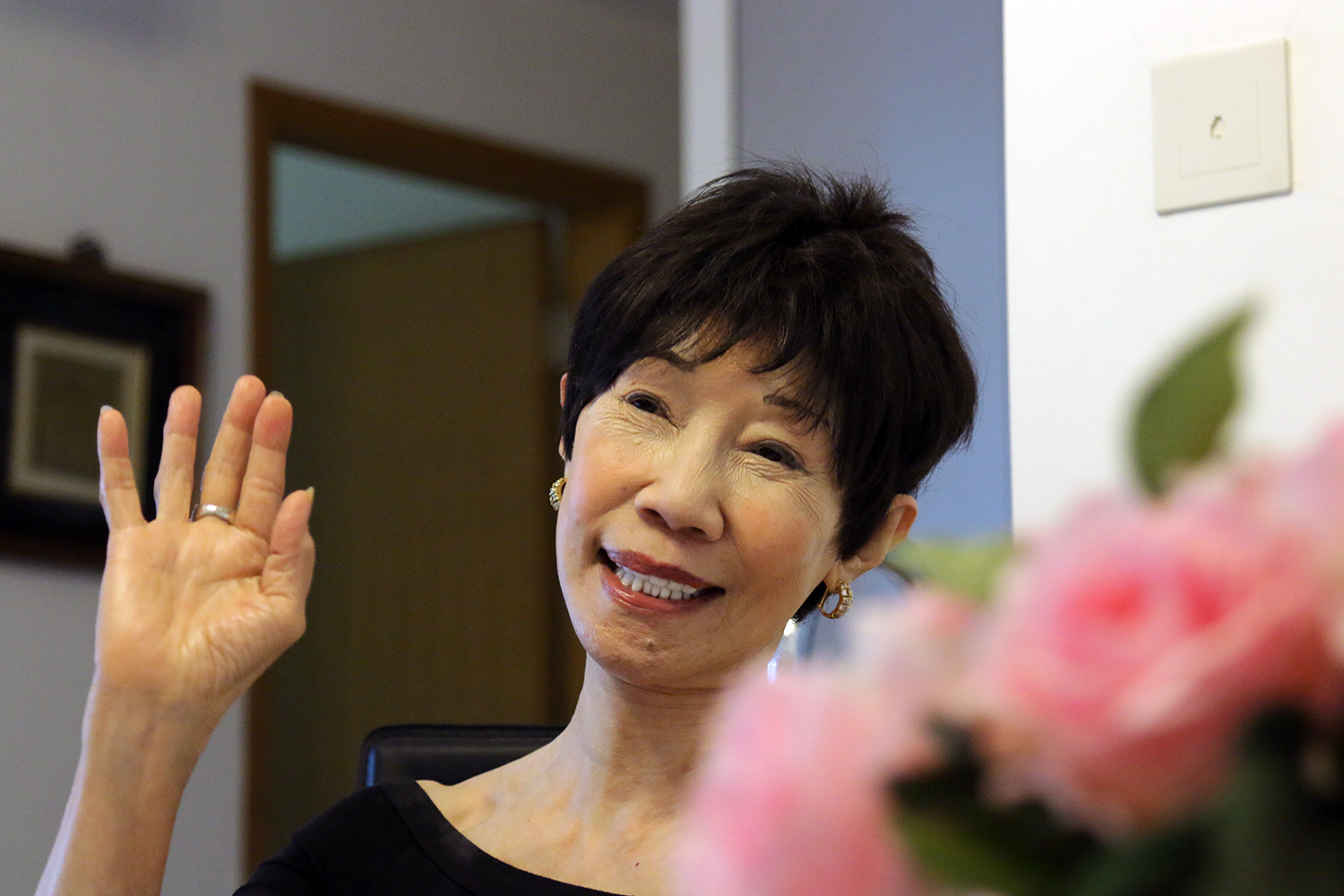 Photo by Joshua Lee
Photo by Joshua Lee
What am I coming to with all this, then? I would venture that my time spent getting to know this woman who defies the decline of age in so many ways was very much a series of lessons Lim was giving me subconsciously in how to voice honest, sincere critique.
Certainly, many things she said about religion, stereotyping, East vs. West influence, interracial marriages, were all controversial and inevitably offensive to various groups in various ways, but somehow, I must admit I felt less like filing a police report against her than I did the urge to engage her in further conversation to understand how she formed those conclusions that I may not have agreed with.
Indeed, many of her views are formed by imperfect, and perhaps in some cases slightly antiquated knowledge too, but the beauty of Lim is that she is self-aware enough to be self-effacing — she uses herself and her own lived experience for her examples, and uses her "own ignorance as a pass".
And I came away continuing to admire what she's doing, understanding even better why.
Top photo by Joshua Lee
If you like what you read, follow us on Facebook, Instagram, Twitter and Telegram to get the latest updates.
